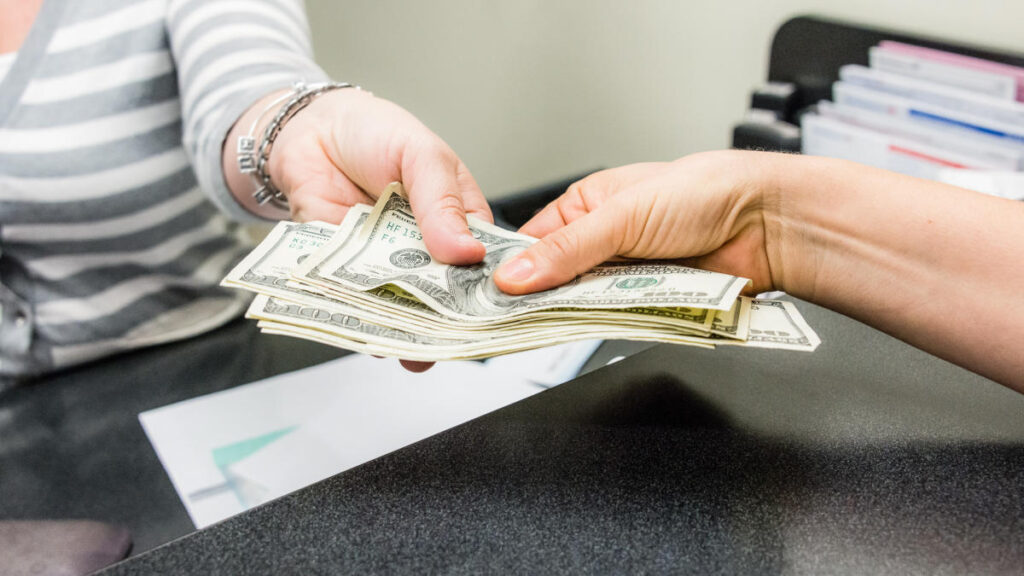Phone:
(701)814-6992
Physical address:
6296 Donnelly Plaza
Ratkeville, Bahamas.

Mistakes are very common, even with bank tellers. These individuals who are charged with handling customer’s cash and negotiable instruments make some clumsy mistakes. One of the common mistakes they make is overextending overdraft, missing crucial details, and the worse, overpaying customers. Though not common, bank tellers are known to overpay customers. If, for instance, a bank teller makes a mistake and overpays you, what happens? What do you do in such a situation?
If the bank teller overpays you, you are expected to return the money. Banks are very careful in their records and auditing process, so you expect them to find out the error sooner than later.
It is not every time banks make mistakes. As a financial institution charged with handling several individual’s money, you expect them to be very meticulous. However, no one is perfect. In light of that, you expect a bank teller to make little mistakes. And one of the most costly mistakes they make is overpaying you. If a bank teller pays you extra, you may be confused. In this article, I will explain what you need to do if such a mistake happens. In addition, I will reveal why failing to return the money is a bad decision.
SEE ALSO: Why You Need a Sydney Financial Advisor for Smart Investment Strategies
To err is human, and no one is safe from making mistakes, including bank employees. When you are handling huge amounts of money and dealing with several customers each day, you will inevitably make a mistake at some point.
While most banks teller mistakes can be easily corrected, others are not so simple to correct, and they can result in huge problems for the unlucky customer whose account is affected. When deposits get mixed up, or bill payment isn’t applied as it ought to, fixing the problem can be a hassle. In some cases, mistakes can go the other way and cause huge problems for the bank instead.
Bank tellers are charged with handling customer financial transactions, such as deposits, withdrawals, transfers, money orders, and checking. They will know the details of the bank’s systems and policies. Sometimes, they are asked to promote the bank’s services, like a special account or an extra checking account.
A bank teller’s tasks may also include counting cash, answering phone calls and taking customer’s complaints, filing deposit slips and paperwork, managing ATM deposits, and balancing numbers at the end of the day.
Bank tellers are humans, like you and me, so don’t expect them to be flawless.
Common mistakes made by these individuals include:
While it has been proven that bank tellers make mistakes, you shouldn’t expect these mistakes to happen often. Most banks have mistaken-proof measures put in place to tackle potential mistakes. Also, always trust the bank to find out. And when they do, you must provide the money given to you mistakenly.
Most times, bank tellers pay for their mistakes. For instance, in June 2013, a German bank employee mistakenly transferred 222 million euros, which is about $293 million, into the account of an unsuspecting retiree rather than the 62.40 euros that were requested. The reason? He had dozed off at his keyboard, which caused his numb fingers to enter 222,222,222.22 mistakenly. Of course, the bank noticed the mistake immediately and fixed it. They were lucky. However, the bank teller and his supervisor weren’t.
In a nutshell, if a bank teller gives you more money and you fail to do the needful, you are indirectly risking the job of the poor bank teller.

Banks have several measures to tackle all sorts of mistakes and issues that could arise during their day-to-day operations. As you probably know, banks often keep records, and like a normal business, they carry out auditing to ensure that all is in place and accounted for. When the bank spots an anomaly, you trust them to figure out the cause.
For instance, if a teller overpays you, the bank will figure out the mistake sooner than later, and when they do, these things will happen:
If a bank teller makes a mistake and overpays you, it is important that you do the right thing, for your sake, and probably that of the erring bank teller. Failing to return the money or lavishing it is a bad move, as the bank eventually finds out. Rather than keep the money to yourself, you should contact the bank and return it.
When you realize that a bank teller offered you more than you requested, don’t get greedy. Don’t thank your lucky stars and convert the money for personal use. Instead, reach out to the bank and tell them what happened. To be sure that it was an actual mistake, request your account balance to verify the money there, including the recently debited amount.
As I earlier said, bank tellers are charged with handling your financial transactions like deposits, withdrawals, transfers, and so on. That said, you expect them to have access to some of your details and your money. Considering that, is it possible for these individuals to steal your money?
Technically a bank teller can steal your money at any given time. However, they will be caught quickly. This is because the activities of this personnel are often monitored, including their internet activity. Thus, stealing your money without being discovered is almost impossible.
Always report unusual transactions on your account to your bank. And if you suspect foul play by the teller, don’t hesitate to talk to the branch manager of your bank.